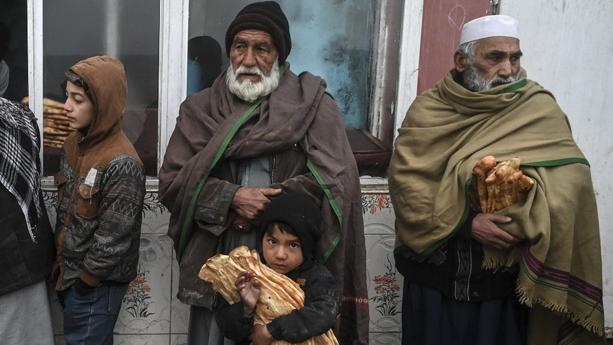 People stand as they receive free bread distributed as part of the Save Afghans From Hunger campaign in front of a bakery in Kabul on Jan 18, 2022. (WAKIL KOHSAR / AFP)
People stand as they receive free bread distributed as part of the Save Afghans From Hunger campaign in front of a bakery in Kabul on Jan 18, 2022. (WAKIL KOHSAR / AFP)
Kabul truck driver Ahmad Siar has been without work for many months, struggling to feed his family amid soaring food prices, with a recent earthquake in the region only making things worse.
“I am always thinking about how to support my family of six children,” he told representatives of the International Committee of the Red Cross, or ICRC, in Afghanistan recently. “Earlier my family could afford to eat a good meal at least once a week, but now we barely manage a good meal once a month.”
He added, “This is not only about me but all Afghans.”
Siar’s point is reinforced by figures that show that more than 7,000 of Afghanistan’s most vulnerable families, amounting to 56,000 people, had to receive assistance from the ICRC through multi-purpose cash grants in the first half of the year. But hundreds of thousands of others still remain in severe need.
Adding to the crisis, one of the worst earthquakes in a decade hit southeastern Afghanistan on June 22, claiming more than 1,000 lives and injuring almost 2,000 others. Tens of thousands of houses were destroyed in the affected area.
China was quick to respond. Relief supplies have been reaching victims since the first batch of donations by the Chinese government was delivered to Afghanistan on June 27. The first batch of supplies, handed over at the Kabul International Airport, included tents, folding beds and blankets, according to Wang Yu, the Chinese ambassador to Afghanistan.
The Chinese government announced on June 25 that it will provide 50 million yuan ($7.5 million) in emergency humanitarian assistance supplies to Afghanistan. The Chinese Red Cross Society is in contact with the Afghan Red Crescent Society for relief efforts.
The Taliban government’s Acting Minister of State for Disaster Management and Humanitarian Affairs Ghulam Ghaws Naseri thanked China and said the supplies are going to the quake victims.
The US, meanwhile, is being widely criticized for not returning around $9.5 billion of Afghanistan central bank assets. Western countries last August also suspended non-humanitarian funding that constituted over 70 percent of the war-torn country’s government expenditures.
“In these testing times, we call on the United States to release Afghanistan’s frozen assets and lift sanctions on Afghan banks so that aid agencies could easily deliver assistance to Afghanistan,” Amir Khan Muttaqi, foreign minister of Afghanistan’s Taliban-led caretaker government, told media in Kabul on June 25.
White House Press Secretary Karine Jean-Pierre said on the same day that the US is “working to address complicated questions” about the use of the frozen funds “to ensure they benefit the people of Afghanistan and not the Taliban”.
Imtiaz Gul, executive director of the Center for Research and Security Studies in Pakistan, told China Daily: “This is indeed unfortunate that Afghanistan has no access to its critical assets in times of urgent need largely because of political limitations of the (Joe) Biden administration.”
Earlier in an interview with Reuters, Afghan foreign ministry spokesman Abdul Qahar Balkhi said his nation “is asking the world to give the Afghans their most basic right, which is their right to life, and that is through lifting the sanctions and unfreezing our assets and also giving assistance”.
A UN envoy last week stressed the need to engage with Afghanistan’s Taliban rulers despite difficulties. In April, dozens of independent UN human rights experts jointly issued a statement saying that the freezing of Afghanistan’s overseas assets by the US has aggravated the plight of Afghan women and children, and calling for the release of the funds.
Salman Bashir, a former Pakistani ambassador to China, said he hopes “the US will reconsider and unfreeze Afghanistan funds”, especially to enable assistance to the earthquake victims. “Humanitarian catastrophe warrants a humane and generous response.”
Compounding the dire situation, the country has been hit by one of the worst droughts in recent years, significantly reducing food crops and water supplies in many parts.
The ICRC said in a statement that it has “helped around 11,000 drought-affected farmers’ households to resume farming activities”. The relief agency noted that many people had been forced to stop farming for some time “as they had to flee their homes because of violence”.
Serving the people of Afghanistan for more than 40 years, the ICRC has launched a cash-for-work project in Gulbahar for the most vulnerable people.
Still, many locals are worried. Haji Mirza, a shopkeeper in Kabul for more than 25 years, has been experiencing lean times while costs have been rising. “More and more customers have been asking me to give them items on credit,” he said.
He said he does not know how long his business can last, and sees no way out of his troubles.
Xinhua contributed to this story.
Contact the writers at vivienxu@chindailyapac.com


